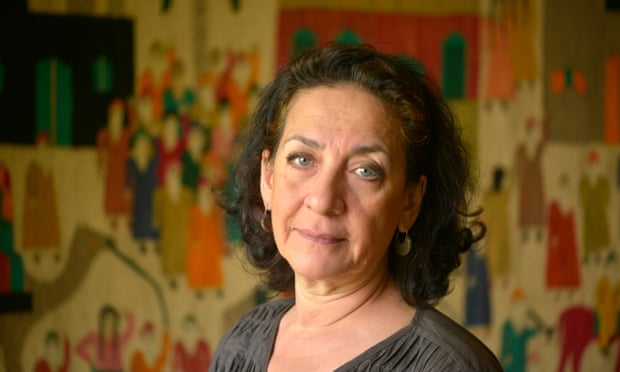Frontlist | Voices of the Lost by Hoda Barakat review – migrant stories
Frontlist | Voices of the Lost by Hoda Barakat review – migrant storieson Feb 17, 2021

“That country is now gone,” observes an unnamed woman in Voices of the Lost. “It is finished, toppled over and shattered like a huge glass vase. To attempt to bring any of this back … could produce only a pure, unadulterated grief, an unbearable bitterness.” The woman is waiting in a hotel in an unnamed European country for a lover she has not seen in decades. As the hours tick by, hope of reunion fades.
In the hotel directory, the woman finds a love letter written in Arabic. Its author reveals himself to be manipulative and abusive, but our nameless narrator feels a bond with him: “It was as if, as soon as my fingers even touched the page, I sensed that the man … [was] familiar, a person I already knew.” She begins a letter of her own.
Voices of the Lost, awarded the 2019 International prize for Arabic fiction, is the latest novel from the celebrated Lebanese writer Hoda Barakat. Translated by Marilyn Booth, the novel is constructed primarily of letters written by five migrants or asylum seekers from the Arab world, all of whom have departed or fled their unnamed countries. The five letters form a chain as each letter falls, by chance, into the hands of another migrant; one letter is salvaged from a trash can, another from the seat of an airplane. The finder is then moved to write their own letter, and thereby make sense of their present isolation.
A man, tortured for months by the secret police of an unnamed Middle Eastern state, recounts to his mother how he became a torturer himself. In his chilling missive, he asks: “So why should I punish myself with thoughts of remorse? … I loved being alive, and I wasn’t the only one who was staying alive through such means.” When his government is toppled, he hides among asylum seekers. After committing a hideous crime, he insists on his blamelessness: “I really didn’t have any choices to make … the circumstances we’re put in have their own laws of necessity.”
The Arab spring, the horrors of Isis, desperate people “pulled out of sea water” – our present world pulses within all five letters; allusions are made to lost homes that might be Lebanon, Syria, Libya, Egypt or Iraq, among others. Against this background of unnamed places and abstracted histories, Barakat attempts to create specificity – real human voices. The voices are often piercing; but at times, they are thin, as if imagined only up to the limit of what the narrative thematically requires. Movingly, they seem to address not their mothers or lovers or brothers, but God or some other omniscience. Under the guise of confession, they reveal a devastating faith and fatalism: “This is the will of the creator.” Another says: “It is in my genes. Given my struggle with the world, the whole world, I have no intention of fighting my own genes too.”
“That country is now gone,” observes an unnamed woman in Voices of the Lost. “It is finished, toppled over and shattered like a huge glass vase. To attempt to bring any of this back … could produce only a pure, unadulterated grief, an unbearable bitterness.” The woman is waiting in a hotel in an unnamed European country for a lover she has not seen in decades. As the hours tick by, hope of reunion fades.
In the hotel directory, the woman finds a love letter written in Arabic. Its author reveals himself to be manipulative and abusive, but our nameless narrator feels a bond with him: “It was as if, as soon as my fingers even touched the page, I sensed that the man … [was] familiar, a person I already knew.” She begins a letter of her own.
Voices of the Lost, awarded the 2019 International prize for Arabic fiction, is the latest novel from the celebrated Lebanese writer Hoda Barakat. Translated by Marilyn Booth, the novel is constructed primarily of letters written by five migrants or asylum seekers from the Arab world, all of whom have departed or fled their unnamed countries. The five letters form a chain as each letter falls, by chance, into the hands of another migrant; one letter is salvaged from a trash can, another from the seat of an airplane. The finder is then moved to write their own letter, and thereby make sense of their present isolation.
A man, tortured for months by the secret police of an unnamed Middle Eastern state, recounts to his mother how he became a torturer himself. In his chilling missive, he asks: “So why should I punish myself with thoughts of remorse? … I loved being alive, and I wasn’t the only one who was staying alive through such means.” When his government is toppled, he hides among asylum seekers. After committing a hideous crime, he insists on his blamelessness: “I really didn’t have any choices to make … the circumstances we’re put in have their own laws of necessity.”
The Arab spring, the horrors of Isis, desperate people “pulled out of sea water” – our present world pulses within all five letters; allusions are made to lost homes that might be Lebanon, Syria, Libya, Egypt or Iraq, among others. Against this background of unnamed places and abstracted histories, Barakat attempts to create specificity – real human voices. The voices are often piercing; but at times, they are thin, as if imagined only up to the limit of what the narrative thematically requires. Movingly, they seem to address not their mothers or lovers or brothers, but God or some other omniscience. Under the guise of confession, they reveal a devastating faith and fatalism: “This is the will of the creator.” Another says: “It is in my genes. Given my struggle with the world, the whole world, I have no intention of fighting my own genes too.”
The five letters are followed by a short section of counterpoints: brief glimpses into the lives of four intended recipients or acquaintances. Rather than letters, these snapshots take the form of internal monologues. A woman, seemingly European, describes an Arab lover whose problems “were all products of a miserable childhood in an ailing country”. A Canadian asserts that if anyone tried to understand “that obscure world ‘close up’, they would return to their family as a few random body parts in a little wooden chest – if they come back at all, that is.” When his daughter accuses of him of a “white man’s indifference”, he wonders: “How well can we ever know people who lived through civil wars? How much can we ever really know about the violence and destruction, the losses, the devastation?”
The recitations in Voices of the Lost are searing. Yet the construction of the novel – the device of found letters, the late addition of a heroic postman keeping a register of what cannot be delivered – creates an uneasy space where contrivance is an insistent part of the fabric. Barakat’s desire to channel certain experiences is vivid; as one character puts it: “It was a desire to insert myself into the logic of a man I do not know … a logic that doesn’t ask for the consent of others …” Occasionally, thematic investigations threaten to replace depth of character. The fourth letter, discovered in a storage locker, prompts the finder to comment: “This letter, which didn’t arrive where it was supposed to arrive, was like a voice that no one has ever heard – never, not since the very beginning. From the day this woman was born her voice was lost.” This is a powerful sentiment whose strength somewhat ebbs as it is repeated across a slender novel. “There are so many of them out there,” says a man who has escaped his father’s tyranny, “people whom life has cast mercilessly out to the margins where no one can see them …” Another writes: “Life unleashes its storms on us and we are no more than feathers whirling in hurricane winds.”
The tragedies of Voices of the Lost are agonising. Collapsed states and familial betrayals have ruptured the men and women within this novel, all of whom have sought and failed to find safety elsewhere. Meanwhile, their countries of refuge view them as undesirables from volatile regions in which they pretend to have no geopolitical or strategic interests: a mass of interchangeable migrants who can only be pitied or feared. This feigned innocence of host countries is, for me, what is subversive in Barakat’s writing. The reader of literature who takes pleasure in vague, generalised pity, who enjoys their own capacity for sympathy, becomes complicit in a continued evasion. The desperation of refugee flight results, necessarily, in an uneasy paper trail, which reads just as uneasily in fictional guise.
Source: Guardian
.jpg)
.jpg)
.jpg)
.jpg)
.jpg)

.jpg)
.jpg)
.jpg)
.jpg)
.jpg)


_(1).jpg)
.jpg)











Sorry! No comment found for this post.